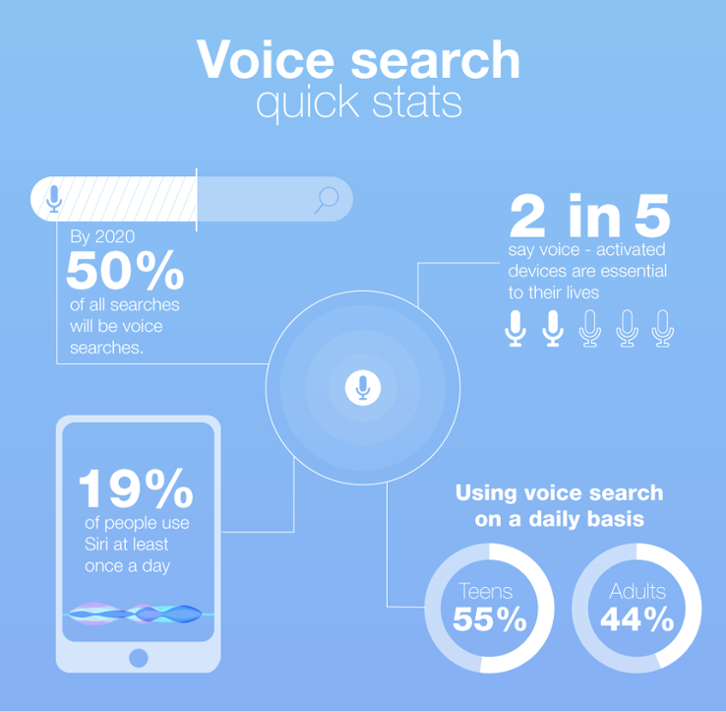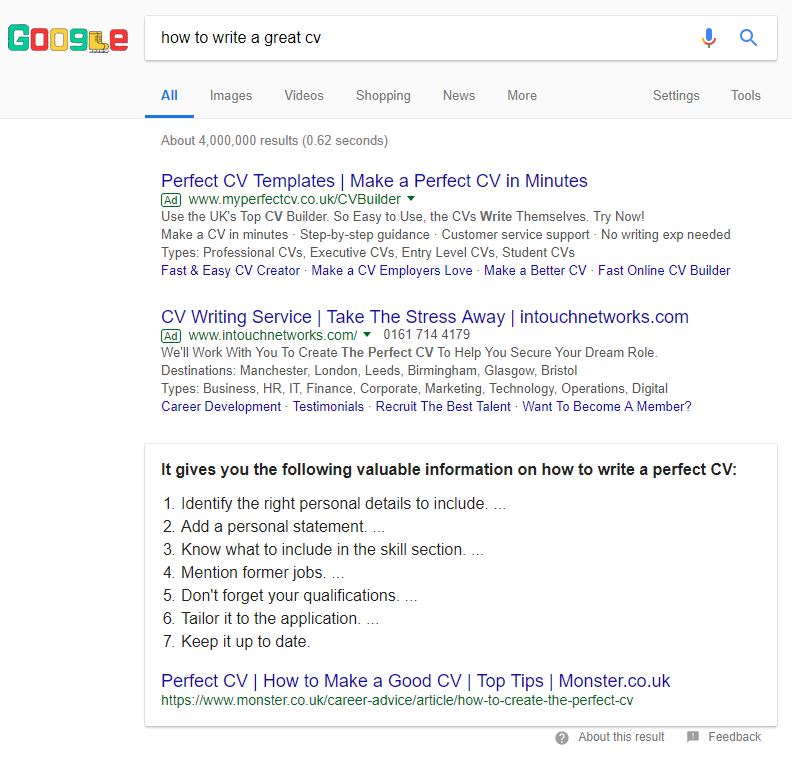
For our 2018 UK & Ireland Recruitment Industry and Technology trends eBook, we asked survey recipients a few key questions regarding the performance of their agency’s website and if they are aware of upcoming changes with Google searches. For any recruitment agency, their website acts as the shop window to both candidates and clients alike, so the importance of their website’s performance in relevant internet searches continues to be a business priority.
Did you know that by 2020, 50% of all searches will be voice searches?
Voice search was a major headline in the tech news of 2017. With the growth in popularity of voice assistants such as the Amazon Echo and Google Home, voice search is changing the way that people interact with the internet and their search queries.
What is Voice Search?
Voice search uses speech recognition technology to allow users to make voice commands to a portable device such as a mobile, tablet or voice assistant. It is undoubtedly interlinked with mobile search, with 19% of people already using Apple’s Siri every day. Significantly, currently 78% of millenials use a mobile device to search for jobs.
With voice search gradually becoming a part of our everyday life, it will be on the radar of many industries. It is already having a profound impact on many sectors such as ecommerce, with studies showing that 1 in 4 people in the US used a voice assistant for shopping over the holiday season. But what will be the impact of voice search on the recruitment industry as a whole and what can you do ensure you stay at the top of Google?

Voice Search And Content
As voice search becomes more prominent, a noteworthy change in the way that internet searches will operate will be focused around semantics. Technology has had to adapt its natural language processing systems to understand search queries being communicated in a much more conversational, human manner. As a result of this, search engines are now much more adept at understanding the more complex (also known as long tailed keywords or search terms) queries which dominate voice search.
As these long tail search terms become used more frequently, recruitment agencies may need to consider the language that they are using in their job adverts and blog content to reflect these changes in terminology. For instance, this would be the difference between:
“Part time waiter jobs East London” (short tail keyword)
verses
“What part time waiter jobs are there in East London?” (long tail keyword)
Long tail queries beginning with question words such as with ‘who, what, where, when, how’ which are indicators of the intent of the candidate, which can be used to your advantage in any content being produced. By understanding the kinds of questions which your potential candidates are asking, you can create content which is structured around these questions. This utilises the way that voice search results work as well as reassuring the candidate that you can answer their queries.
Research has been conducted which shows that 48% of people would like to receive personalised tips and information with their voice assistance queries. By writing FAQs and useful content that addresses your target audience’s (i.e. candidates) “pain points” you can appear in more Google searches and attract candidates earlier in their job search.
In addition to creating job adverts that are written with voice search in mind, this approach also demonstrates how effective content marketing and blogging can be if it is well executed. To find out more about inbound marketing, download our Inbound Marketing For Recruitment Agencies eBook here.
Voice Search And Location-Based Results
When voice searches are performed on mobile devices, they are embedded with geographic information that isn’t always enabled on desktop devices. This means that if a candidate were to search for jobs using a particular job title, the GPS on the device they are using will be able to add this location information to their query. These location-specific web pages are more likely to appear first in the search engine results pages of Google and Bing.
By ensuring that your job adverts are clearly listed with their location, recruitment agencies can avoid missing any of the location based search traffic which is increasingly coming from voice search.
Voice Search and SEO
For the location-based results to work, local SEO for recruitment agencies is essential. Your listings may be ranking satisfactorily on desktop for generic searches, but it can be another story in the results for a voice search. As mentioned previously, SEO must be a vital element of your strategy in order to reap the rewards of voice searches.
Your SEO strategy doesn’t stop there, however. The rise in voice search has also accelerated a rise in the importance of featured snippets. A featured snippet (also known as an answer box) is the result which occasionally comes up in Google searches for specific queries.

These featured snippets take up more “real estate” on search engine results pages, often appearing before the Number 1 position on Google, and are of specific interest with regards to voice search results.
If a candidate were to use a voice assistant such as the Google Home Mini or Amazon Alexa, the featured snippet will be the first result that is read out. Recruitment agencies can use this to their advantage by optimising content such as industry-related blogs with answer box status in mind. Gaining an answer box is not an exact science, but ensuring that your content is written with your audience in mind is best practice for search engine visibility, regardless. If you’d like to learn more about the tactics that you can use for featured snippet status, have a look at this blog from Moz.
What Impact Will Voice Search Have On Recruitment?
Since Apple introduced Siri in 2011, the use of voice search has steadily grown. Considering the huge investments made by rivals Google, Microsoft and Amazon in 2017 things don’t look to be slowing down any time soon.
It seems likely that voice search will be heavily linked to search engine optimisation (SEO) and content marketing. The more candidates and clients who opt to use voice search in their everyday lives, the more important SEO and your content marketing strategy will become in attracting potential visitors to your website and increasing your brand awareness.
To find out the other predictions and insights for the UK and Ireland recruitment industry in 2018 download our free eBook below.
